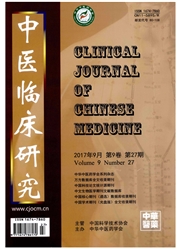

 中文摘要:
中文摘要:
气道重塑为慢性阻塞性肺疾病(chronic obstructive pulmonary disease,COPD)病程发生发展的关键病理,是引起气道阻塞和肺功能进行性下降的重要因素。早期针对气道重塑的治疗,可能是逆转COPD病程进展的重要策略。核因子KB(nuclearfactor-κB,NF-κB)/转化生长因子β1(transforming growth factor-β1,TGF—β1)/Smads信号通路由NF-κB和TGF—β1/Smads两通路组成,其信号转导异常参与气道的慢性炎症损伤与修复、气道平滑肌细胞及成肌纤维细胞增殖和气道细胞外基质代谢失衡等病理反应,在COPD气道重塑过程中起着重要调控作用。现就其在COPD气道重塑过程中的作用进行综述,为进一步开展COPD防治研究提供依据。
 英文摘要:
英文摘要:
Airway remodeling is not only a key pathology in the development of chronic obstructive pulmonary disease (COPD), but also a key factor in the declining of airway obstruction and lung function in COPD. Therefore, earlier treatment on airway remodeling is probably an important strategy to reverse COPD progression. Nuclear factor-κB (NF-κB)/transforming growth factor-β1 (TGF-β1)/Smads signaling pathway is composed of signaling NF-κB and TGF-β1/Smads, its abnormal transduction plays a notable regulatory role in COPD airway remodeling due to its involvement in pathological reactions such as airway damage and repair caused by chronic inflammation, airway smooth muscle cells and myofibroblast proliferation and airway extracellular matrix metabolic imbalance. In view of this, the passage will make a review on the function of NF-κB/TGF-β/Smads signaling pathway in COPD airway remodeling process so as to provide basis for further study.
 同期刊论文项目
同期刊论文项目
 同项目期刊论文
同项目期刊论文
 Long-term effects of three Tiao-Bu Fei-Shen therapies on NF-κB/TGF-β1/smad2 signaling in rats with c
Long-term effects of three Tiao-Bu Fei-Shen therapies on NF-κB/TGF-β1/smad2 signaling in rats with c 期刊信息
期刊信息
